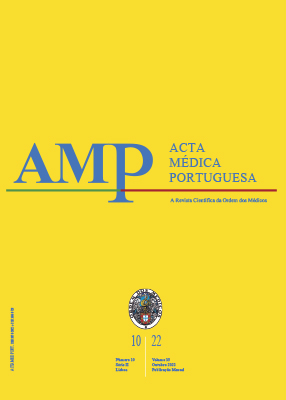Association between Body Mass Index and Gestational Weight Gain with Obstetric and Neonatal Complications in Pregnant Women with Gestational Diabetes
DOI:
https://doi.org/10.20344/amp.15896Keywords:
Body Mass Index, Gestational Diabetes, Gestational Weight Gain, Infant, Newborn, Postpartum Period, Pregnancy ComplicationsAbstract
Introduction: Gestational diabetes is a condition that predisposes to complications during pregnancy and to the newborn. The aim of this study was to assess the association between body mass index and gestational weight gain and obstetric and neonatal complications in pregnant women with gestational diabetes.
Material and Methods: Retrospective cohort study involving 13 467 singleton pregnancies with gestational diabetes, diagnosed between 2014 and 2018, in Portugal. This sample was distributed according to the World Health Organization body mass index categories (underweight, normal, overweight, or obese) and according to the Institute of Medicine guidelines for gestational weight gain groups (adequate, insufficient, or excessive). Binomial and multinomial logistic regression models were applied to determine risk factors for complications in pregnant women with gestational diabetes. Data analysis was performed with SPSS version 25.
Results: Pregestational overweight and obesity were associated with an increased risk of maternal morbidity (aOR: 1.31; aOR: 2.42), gestational hypertension (aOR: 1.56; aOR: 2.79) and caesarean section (aOR: 1.22; aOR: 1.77) whilst reducing the risk for small for gestational age [aOR: 0.73; aOR: 0.64 (Fenton chart); aOR: 0.69; aOR: 0.66 (Portuguese chart)]. Obesity alone was associated with increased preeclampsia events (aOR: 3.05), respiratory distress syndrome (aOR: 1.69), admission to neonatal intensive care unit (aOR: 1.54), macrosomia (aOR: 2.18), and large for gestational age [aOR: 2.03 (Fenton); aOR: 1.87 (Portuguese)] and decreased risk of low birthweight newborns (aOR: 0.62). Insufficient gestational weight gain was associated with a decreased risk of gestational hypertension (aOR: 0.69), preeclampsia (aOR: 0.44), Caesarean section (aOR: 0.81) and large for gestational age [aOR: 0.74 (Portuguese)] and increased risk of low birthweight (aOR: 1.36) and small for gestational age [aOR: 1.40 (Fenton)]. Excessive gestational weight gain was associated with increased risk of gestational hypertension (aOR: 1.53), hydramnios (aOR: 2.05), macrosomia (aOR: 2.02), and large for gestational age [aOR: 1.94 (Fenton); aOR: 1.92 (Portuguese)].
Conclusion: Pregestational overweight and obesity, as well as excessive weight gain are associated with an increased risk of certain obstetric and neonatal complications. It is essential to have an appropriate pre- onceptional surveillance and a close follow-up during pregnancy in order to reduce the associated risks and the probable predisposition of these newborns to severe outcomes.
Downloads
Downloads
Published
How to Cite
Issue
Section
License
Copyright (c) 2022 Acta Médica Portuguesa

This work is licensed under a Creative Commons Attribution-NonCommercial 4.0 International License.
All the articles published in the AMP are open access and comply with the requirements of funding agencies or academic institutions. The AMP is governed by the terms of the Creative Commons ‘Attribution – Non-Commercial Use - (CC-BY-NC)’ license, regarding the use by third parties.
It is the author’s responsibility to obtain approval for the reproduction of figures, tables, etc. from other publications.
Upon acceptance of an article for publication, the authors will be asked to complete the ICMJE “Copyright Liability and Copyright Sharing Statement “(http://www.actamedicaportuguesa.com/info/AMP-NormasPublicacao.pdf) and the “Declaration of Potential Conflicts of Interest” (http:// www.icmje.org/conflicts-of-interest). An e-mail will be sent to the corresponding author to acknowledge receipt of the manuscript.
After publication, the authors are authorised to make their articles available in repositories of their institutions of origin, as long as they always mention where they were published and according to the Creative Commons license.









